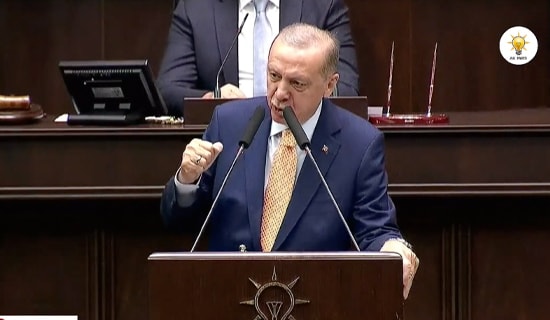The establishment and independent Egyptian press – the vast majority of which staunchly supports the regime of Egyptian President Abdel Fattah Al-Sisi – provided noticeably scant coverage of the unexpected June 17, 2019 death of former Egyptian president Mohamed Morsi. Morsi, a top Muslim Brotherhood figure, had been ousted in 2013 by Al-Sisi, and had been imprisoned ever since.
The Egyptian Al-Ahram establishment daily reported the news on page four, in the section titled "Events," with no mention of Morsi's presidency. The establishment daily Al-Akhbar also buried the announcement, on page three. The privately owned papers reported his death in the same way, except for Al-Masry Al-Youm, which published it on the front page.[1]
The Egyptian website Madamaser.com, which is known for its criticism of the current regime and has been blocked inside Egypt by the regime since 2017, reported that most of the Egyptian papers published the same version of the notice of Morsi's death – a 42-word item devoid of details about him except for his name and the fact that he had been accused of involvement in espionage. Madamaser.com also wrote that the text of the notice had been conveyed to the papers' managers in a WhatsApp group in which regime apparatuses routinely issue instructions. It added that that the Egyptian papers had been instructed not to publish the notice on the front page, but to bury it inside the issue of the paper.[2]
Morsi death notices on inside pages of Egyptian establishment newspapers (Source: fj-p.net, June 18, 2019).

Report of Morsi's death on the front page of the privately owned Al-Masry Al-Youm daily (Source: Al-Masry Al-Youm, Egypt, June 18, 2019).
During the two days following Morsi's death, the regime-affiliated newspapers focused on repudiating Muslim Brotherhood accusations that the regime itself was guilty of "deliberately eliminating" Morsi by means of medical neglect and intolerable prison conditions,[3] on rebuffing similar Human Rights Watch claims, and on rejecting a UN Human Rights Commission demand for an international investigation into the circumstances of his death – perceived as indicative of mistrust in the Egyptian legal system.[4] The Egyptian press also focused on smearing both the Muslim Brotherhood and Morsi's legacy, publishing articles criticizing them.[5]
In response, Egyptian journalist Suleiman Guda, in Al-Masry Al-Youm, criticized the scant coverage of Morsi's death in the Egyptian media, calling it "punishing the [Egyptian] reader who heard the news everywhere, but... found no mention of it" in the Egyptian press.
SUPPORT OUR WORK

The following are translated excerpts from Guda's article:[6]
"I searched for the notice about Mohamed Morsi's death in the country's newspapers, and found it not in the appropriate spot, but on an inside page, in a place where it could not be discerned with the naked eye. This was despite the fact that the news item in question is of major importance, no matter what you think about Morsi or whatever your attitude toward him or his organization [the Muslim Brotherhood].
"The attorney-general's urgent announcement [of Morsi's death] two hours after it occurred is proof of the importance of the news... again, no matter what you think about the Muslim Brotherhood or Morsi himself – who was after all president for an entire year, and who died suddenly during his trial... All these factors grant the item importance, preference, and precedence over many [other] items!
"I am talking about the reader's right to service from the press, for which he pays two Egyptian pounds of his hard-earned money. I am talking about his right to know, and his right to obtain this information inside his own country, on the soil of his homeland, and from its own newspapers – and not to have to search for it beyond the border...
"Yesterday morning [June 18], when the Al-Sharq Al-Awsat newspaper came out in London, the announcement was the lead story on its front page, and the details of the death were provided to its readers in every capital city around the world. Of course, [this is] not because this paper belongs to or identifies with the Muslim Brotherhood... on the contrary, this is the Arab newspaper that is the farthest from all of that, and every morning it publishes [items] exposing the Muslim Brotherhood's extremist ideology. But all that is one thing, and the reader's right to know, and respect for [Morsi], are another thing entirely...
"The [Egyptian press'] handling of the news of [Morsi's] death is not punishing Morsi. It is punishing the [Egyptian] reader, who heard the news everywhere but when he paged through the country's newspapers found no mention [of it]!"
[1] Al-Sharq Al-Awsat (London), June 19, 2019; fj-p.net, June 18, 2019.
[2] Madamasr.com, June 18, 2019.
[3] This claim was voiced by two factions of the Muslim Brotherhood – the young and militant faction, and the older faction, directed by the acting supreme guide of the Muslim Brotherhood in Egypt, Mahmoud Ezzat. Ikhwanonline.info, June 17, 2019; Ikhwanonline.com, June 17, 2019.
[4] Al-Ahram (Egypt), June 20, 2019.
[5] Articles by journalists affiliated with the regime stated that there was no reason to feel sorry for the terrorist Muslim Brotherhood members, who are themselves merciless. See for example Al-Yawm Al-Sabi (Egypt), June 19, 2019; Al-Masry Al-Youm (Egypt), June 19, 2019.
[6] Al-Masry Al-Youm (Egypt), June 19, 2019.




